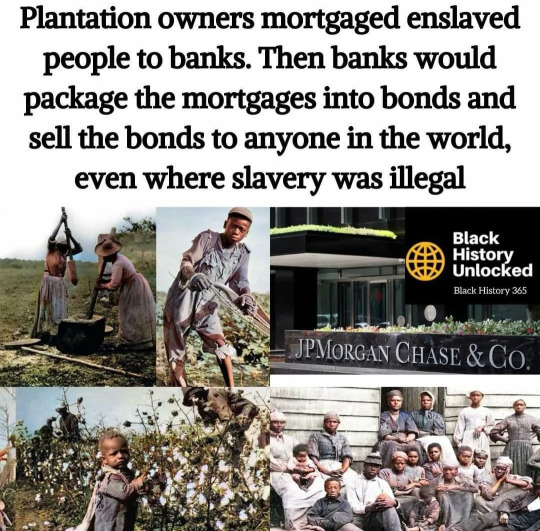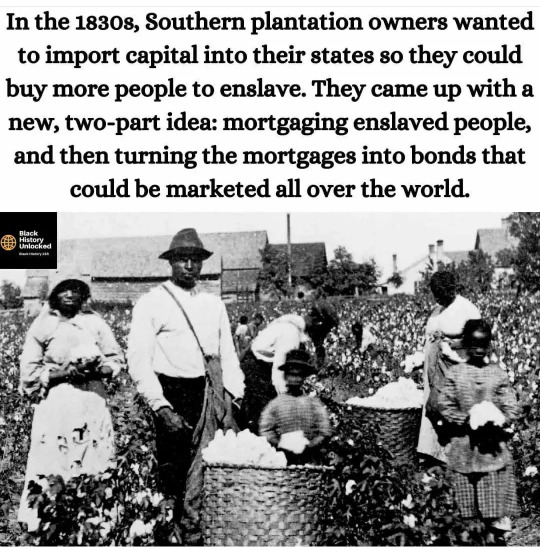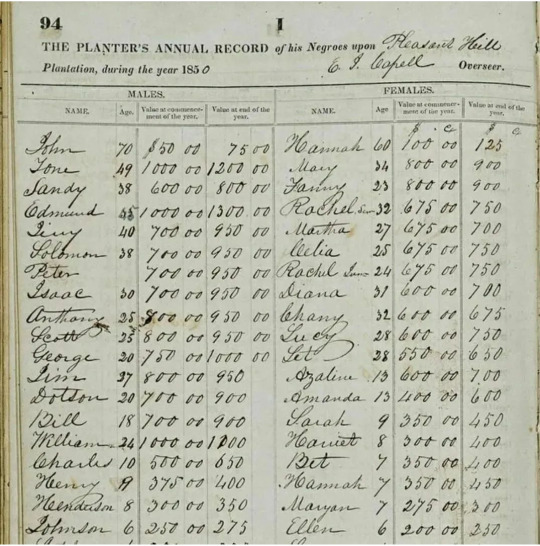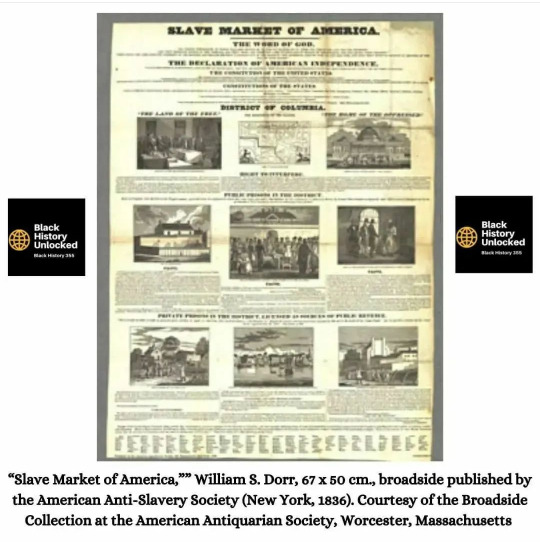#Civil Rights in america
Text
Ben & Jerry's Celebrates the Power of Black Voters with Rebrand of Change is Brewing Flavor
Ben & Jerry's Celebrates the Power of Black Voters with Rebrand of Change is Brewing Flavor
National Campaign Kicks Off With a Seven-Week Tour in Georgia Encouraging Fans to Stand Up For Voting Rights and Turn Out for Historic Midterms
ATLANTA, Sept. 20, 2022 /PRNewswire/ -- Today, on National Voter Registration Day, Ben & Jerry's, alongside Black Voters Matter, is unveiling a sweet new look and mission to their popular flavor, "Change is Brewing" — a cool combination of cold brew ice cream, marshmallow swirls, and fudge brownies. This rebranded flavor is focused on advancing racial justice through protecting voting rights and encouraging voter turnout ahead of November's midterm elections by connecting voters with the Ben & Jerry's Voter Resource Center.
Black Voters Matter and Ben & Jerry's unveil the Relaunched Change Is Brewing Flavor to Celebrate the Power of Black Voters and Encourage Fans to Stand Up For Voting Rights and Turn Out for Historic Midterms
Ben & Jerry's Celebrates the Power of Black Voters with Rebrand of Change is Brewing Flavor and National Campaign
At the founding of our nation, voting was limited to white, land-owning men. It was only in recent history that all Black people have had the right to vote, and even that was, and still is, a hard-fought right. The Voting Rights Act, landmark civil rights legislation passed in 1965, put important safeguards in place to protect the rights of Black voters. However, the Voting Rights Act was gutted in a 2013 Supreme Court decision that paved the way for a number of states to pass regressive voter suppression laws that make it harder, not easier, for people of color and young people to vote. Many states have since passed regressive voter ID laws, limited mail-in voting, and even limited distribution of water in voting lines.
"It is precisely because of the power of the Black vote that a number of states — all controlled by Republicans — are trying so hard to suppress it,'' said Maroni Minter, US Activism Manager for Ben & Jerry's. "That's why today we are also excited to kick off a seven-week tour of Georgia in partnership with Black Voters Matter to engage voters across the state and connect them with information and tools they need to ensure that their vote is counted and their power is felt. And yes, there will be free ice cream."
The seven-week tour, in conjunction with the Black Voters Matter We Won't Black Down tour, will crisscross the state of Georgia in a Ben & Jerry's Scoop Truck, hosting events and engaging voters in the run-up to the historic midterm election. The tour will visit HBCUs, big cities, and rural communities in partnership with Black Voters Matter, serving up free scoops of the decadent coffee-based flavor that is as delicious as it is inspiring. Black Voters Matter works 365 days a year, in Georgia and beyond, to build power in marginalized, predominantly Black communities. The tour is part of a larger campaign that will use digital and social media channels, radio, newspaper, and outdoor advertising to encourage participation in the midterms and connect people to the Ben & Jerry's Voter Resource Center, a tool that allows voters to check their voter-registration status, register to vote, find their polling place, and identify key election-related dates.
"Mobilizing and community-building with Black voters is mission critical for BVM," said Cliff Albright and LaTosha Brown, co-founders of BVM, in a joint statement. "There are so many pressing national and local issues at the forefront right now from healthcare to housing to basic needs like access to clean water, which we know disproportionately impacts Black communities. While voting is always an exercise in using our power, we know this year that our safety, our health, our freedom is also on the ballot. And change happens when we use our power collectively at the voting booth. We look forward to partnering with Ben & Jerry's while on our tour this fall, which has for so long been a voice for change in our communities, and will continue to do the necessary work of increasing progressive power through movement-building."
The rebranded "Change is Brewing" pint design features the work of Black multi-disciplinary artist Laci Jordan, and builds on her first pint design. "Last year when we launched the Change is Brewing flavor, I imagined my ideal version of the world for Black communities. This year, the new visual reflects what I see as one of the integral pathways to actualizing that world - voting. This artwork underscores how important it is for the Black community to have access to the ballot box and to use our votes to move our communities and each other forward."
The deep, rich coffee flavor in "Change is Brewing" is from BLK & Bold, the first Black-owned, nationally distributed coffee company — 5% of their profits go to programs to provide resources to youth in need. Greyston Bakery — a values-led supplier and longtime Ben & Jerry's partner known for their groundbreaking Open Hiring program — provides the scrumptious fudge brownies. A portion of the proceeds from the sale of Change is Brewing will go to Black Voters Matter to support their work.
To check your voter registration, eligibility status, and to pledge and make a plan to vote, visit action.benjerry.com/vote and then treat yourself to a pint of our new "Change is Brewing" to celebrate (in stores soon).
About Ben & Jerry's
Ben & Jerry's is an aspiring social justice company that believes in a greater calling than simply making and selling the world's best ice cream. The company produces a wide variety of super-premium ice cream and Non-Dairy/vegan desserts using high-quality ingredients and lots of big chunks and swirls. As a certified B Corp, Ben & Jerry's incorporates its vision of Linked Prosperity into its business practices via values-led sourcing initiatives when purchasing ingredients. Ben & Jerry's is distributed in more than 35 countries in supermarkets, grocery stores, convenience stores, franchised Scoop Shops, and via on-demand delivery services. Ben & Jerry's, a Vermont corporation and wholly owned subsidiary of Unilever, operates its business on a three-part Mission Statement emphasizing product quality; a fair financial return; and social, racial, and environmental injustice around the globe. The Ben & Jerry's Foundation, guided by Ben & Jerry's employees, granted $3.4MM in 2020 to support progressive, justice-focused grassroots organizing around the country. For up-to-date information, visit benjerry.com.
About Black Voters Matter
Black Voters Matter, a 501c4, and Capacity Building Institute, a 501c3, are dedicated to expanding Black voter engagement and increasing progressive power through movement-building and engagement. Working with grassroots organizations, specifically in key states in the South, BVM seeks to increase voter registration and turnout, advocate for policies to expand voting rights/access, and help develop infrastructure where little or none exists to support a power-building movement that keeps Black voters and their issues at the forefront of our election process.
For more information, please visit https://www.blackvotersmatterfund.org/
Ben & Jerry's relaunches Change Is Brewing flavor to target regressive voting practices and ensure all have an equal vote.
Ben & Jerry's relaunches Change Is Brewing flavor to target regressive voting practices and ensure all have an equal vote.
Ben & Jerry's relaunches Change Is Brewing flavor to target regressive voting practices and ensure all have an equal vote.
#Ben & Jerry's Celebrates the Power of Black Voters with Rebrand of Change is Brewing Flavor#Ben and Jerrys#Black Votes Matter#Change is Brewing Flavor#civil rights in america#voting rights in america#Black Lives Matter#voter disinfranchisement#Black Voters Matter Bus Tour
17 notes
·
View notes
Text
Aziraphale’s Choice, the Job Connection, and Michael Sheen’s Morality
Update: Michael Sheen liked this post on Twitter, so I'm fairly certain there is a lot of validity to it.
I’ve had time to process Aziraphale’s choice at the end of Season 2. And I think only blaming the religious trauma misses something important in Aziraphale’s character. I think what happened was also Aziraphale’s own conscious choice––as a growth from his trauma, in fact. Hear me out.
Since November 2022 I’ve been haunted by something Michael Sheen said at the MCM London Comic Con. At the Q&A, someone asked him about which fantasy creature he enjoyed playing most and Michael (bless him, truly) veered on a tangent about angels and goodness and how, specifically,
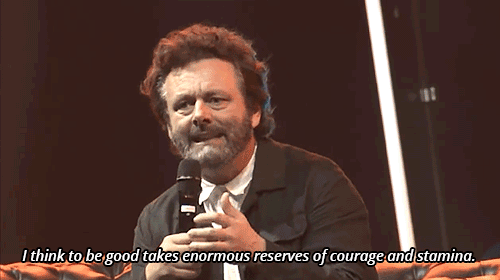
We as a society tend to sort of undervalue goodness. It’s sort of seen as sort of somehow weak and a bit nimby and “oh it’s nice.” And I think to be good takes enormous reserves of courage and stamina. I mean, you have to look the dark in the face to be truly good and to be truly of the light…. The idea that goodness is somehow lesser and less interesting and not as kind of muscular and as passionate and as fierce as evil somehow and darkness, I think is nonsense. The idea of being able to portray an angel, a being of love. I love seeing the things people have put online about angels being ferocious creatures, and I love that. I think that’s a really good representation of what goodness can be, what it should be, I suppose.
I was looking forward to BAMF!Aziraphale all season long, and I think that’s what we got in the end. Remember Neil said that the Job minisode was important for Aziraphale’s story. Remember how Aziraphale sat on that rock and reconciled to himself that he MUST go to Hell, because he lied and thwarted the will of God. He believed that––truly, honestly, with the faith of a child, but the bravery of a soldier.
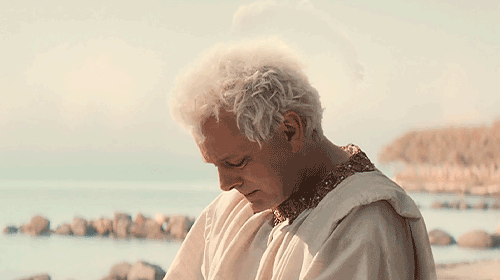
Aziraphale, a being of love with more goodness than all of Heaven combined, believed he needed to walk through the Gates of Hell because it was the Right Thing to do. (Like Job, he didn’t understand his sin but believed he needed to sacrifice his happiness to do the Right Thing.)
That’s why we saw Aziraphale as a soldier this season: the bookshop battle, the halo. But yes, the ending as well.
Because Aziraphale never wanted to go to Heaven, and he never wanted to go there without Crowley.
But it was Crowley who taught him that he could, even SHOULD, act when his moral heart told him something was wrong. While Crowley was willing to run away and let the world burn, it was Aziraphale (in that bandstand at the end of the world) who stood his ground and said No. We can make a difference. We can save everyone.

And Aziraphale knew he could not give up the ace up his sleeve (his position as an angel) to talk to God and make them see the truth in his heart.
I was messed up by Ineffable Bureaucracy (Boxfly) getting their happy ending when our Ineffable Husbands didn’t, but I see now that them running away served to prove something to Aziraphale. (And I am fully convinced that Gabriel and Beelzebub saw the example of the Ineffables at the Not-pocalypse and took inspiration from them for choosing to ditch their respective sides)
But my point is that Aziraphale saw them, and in some ways, they looked like him and Crowley. And he saw how Gabriel, the biggest bully in Heaven, was also like him in a way (a being capable of love) and also just a child when he wasn’t influenced by the poison of Heaven. Muriel, too, wasn’t a bad person. The Metatron also seemed to have grown more flexible with his morality (from Aziraphale's perspective). Like Earth, Heaven was shades of (light?) gray.
Aziraphale is too good an angel not to believe in hope. Or forgiveness (something he’s very good at it).
Aziraphale has been scarred by Heaven all his life. But with the cracks in Heaven’s armor (cracks he and Crowley helped create), Aziraphale is seeing something else. A chance to change them. They did terrible things to him, but he is better than them, and because of Crowley, he feels ready to face them.
(Will it work? Can Heaven change, institutionally? Probably not, but I can't blame Aziraphale for trying.)
At the cafe, the Metatron said something big was coming in the Great Plan. Aziraphale knows how trapped he had felt when he didn’t have God’s ear the first time something huge happened in the Big Plan. He can’t take a chance again to risk the world by not having a foot in the door of Heaven. That’s why we saw individual human deaths (or the threat of death) so much more this season: Elspeth, Wee Morag, Job’s children, the 1940s magician. Aziraphale almost killed a child when he couldn’t get through to God, and he’s not going through that again.
“We could make a difference.” We could save everyone.

Remember what Michael Sheen said about courage and doing good––and having to “look the dark in the face to be truly good.” That’s what happened when Aziraphale was willing to go to Hell for his actions. That’s what happened when he decided he had to go to Heaven, where he had been abused and belittled and made to feel small. He decided to willingly go into the Lion’s Den, to face his abusers and his anxiety, to make them better so that they would not try to destroy the world again.
Him, just one angel. He needed Crowley to be there with him, to help him be brave, to ask the questions that Heaven needed to hear, to tell them God was wrong. Crowley is the inspiration that drives Aziraphale’s change, Crowley is the engine that fuels Aziraphale’s courage.
But then Crowley tells him that going to Heaven is stupid. That they don’t need Heaven. And he’s right. Aziraphale knows he’s right.
Aziraphale doesn’t need Heaven; Heaven needs him. They just don’t know how much they need him, or how much humanity needs him there, too. (If everyone who ran for office was corrupt, how can the system change?)
Terry Pratchett (in the Discworld book, Small Gods) is scathing of God, organized religion, and the corrupt people religion empowers, but he is sympathetic to the individual who has real, pure faith and a good heart. In fact, the everyman protagonist of Small Gods is a better person than the god he serves, and in the end, he ends up changing the church to be better, more open-minded, and more humanist than god could ever do alone.
Aziraphale is willing to go to the darkest places to do the Right Thing, and Heaven is no exception. When Crowley says that Heaven is toxic, that’s exactly why Aziraphale knows he needs to go there. “You’re exactly is different from my exactly.”
____
In the aftermath of Trump's election in the US, Brexit happened in 2018. Michael Sheen felt compelled to figure out what was going on in his country after this shock. But he was living in Los Angeles with Sarah Silverman at the time, and she also wanted to become more politically active in the US.
Sheen: “I felt a responsibility to do something, but it [meant] coming back [to Britain] – which was difficult for us, because we were very important to each other. But we both acknowledge that each of us had to do what we needed to do.” In the end, they split up and Michael moved back to the UK.
Sometimes doing the Right Thing means sacrificing your own happiness. Sometimes it means going to Hell. Sometimes it means going to Heaven. Sometimes it means losing a relationship.
And that’s why what happened in the end was so difficult for Aziraphale. Because he loves Crowley desperately. He wants to be together. He wanted that kiss for thousands of years. He knows that taking command of Heaven means they would never again have to bow to the demands of a God they couldn’t understand, or run from a Hell who still came after them. They could change the rules of the game.
And he’s still going to do that. But it hurts him that he has to do that alone.
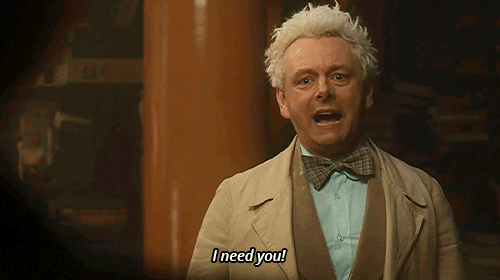
#good omens#good omens 2#ineffable husbands#it's kinda like capt america: civil war#with Azi as Tony Stark: traumatized and trying to do the right thing#and Crowley being Steve Rogers: fuck the establishment let's go rogue#gos2spoilers#good omens meta#good omens 2 meta#go s2#michael sheen#go s2 meta#go meta#*mine#*mymeta#ineffables husbands#ineffable soulmates#*mybest
11K notes
·
View notes
Text

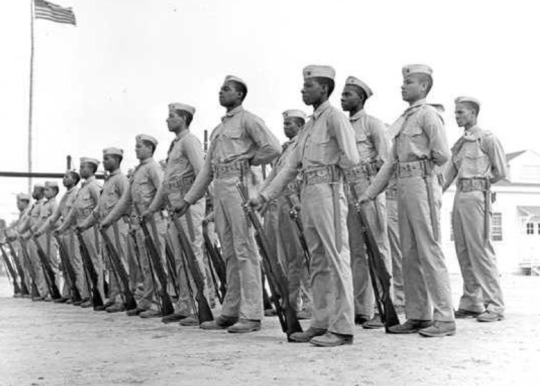


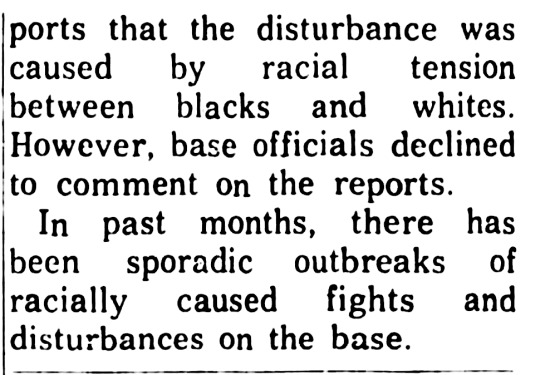


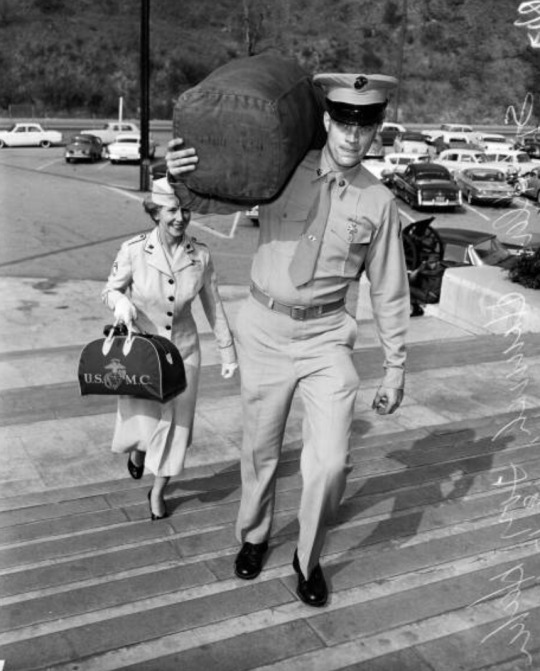
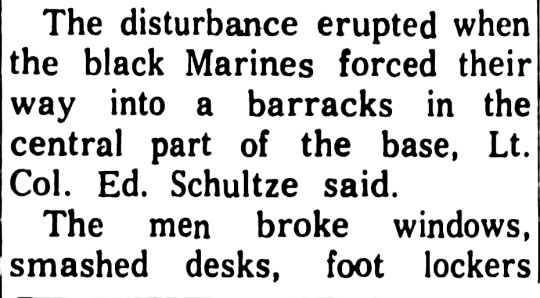

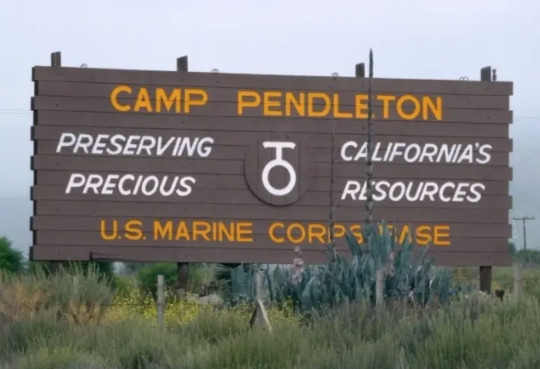


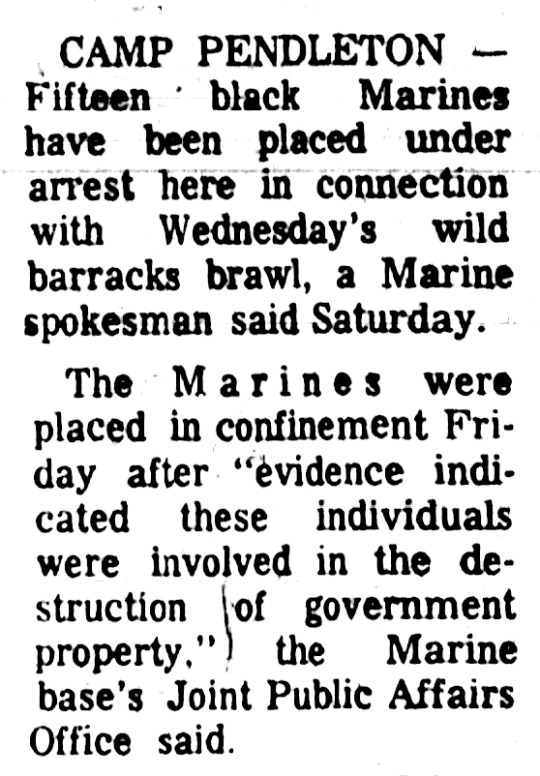
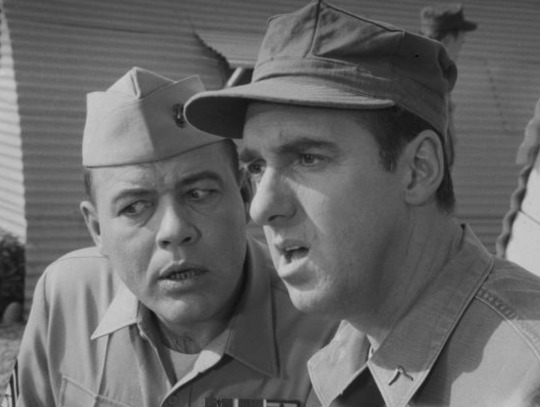
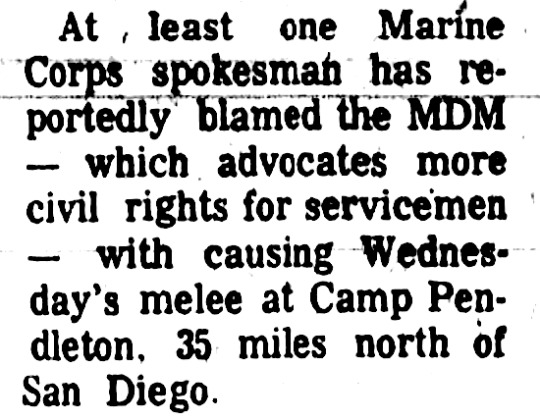


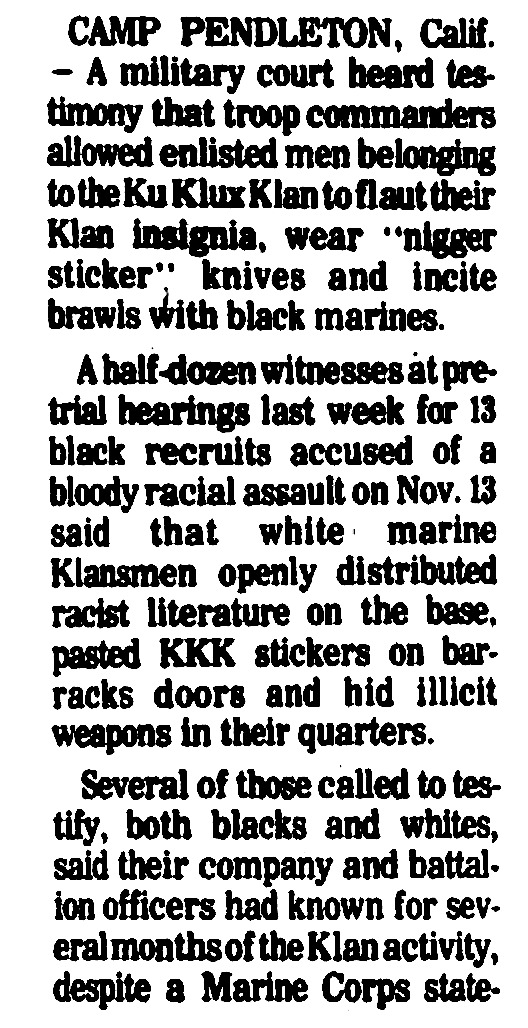
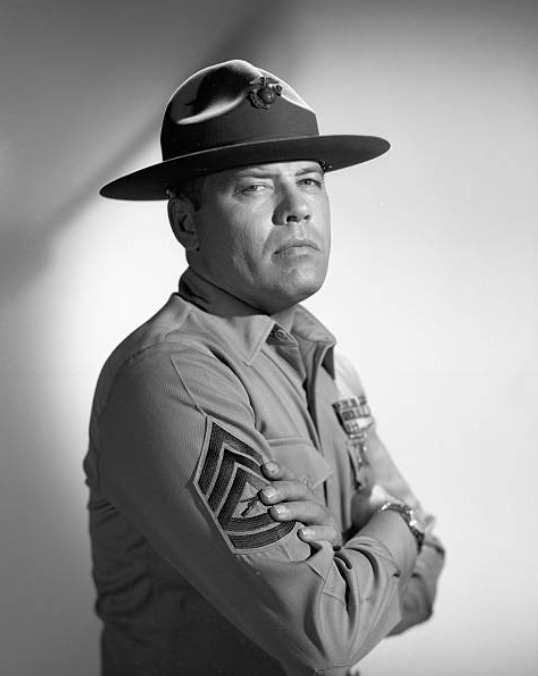
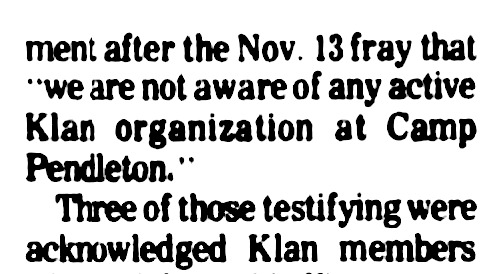
1970-1977.
Throughout the 1970s, Black marines engaged in open warfare with KKK marines at Camp Pendleton.
2K notes
·
View notes
Text
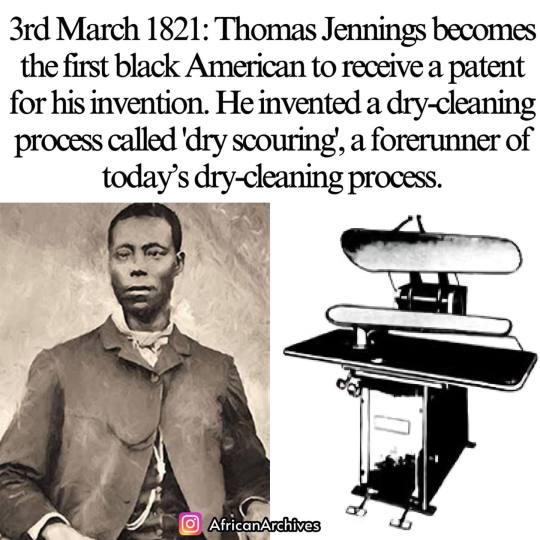
Thomas Jennings was a free man born in 1791 in New York City. He was 30 years old when he was granted a patent for a dry cleaning process. In his early 20s Thomas Jennings became a tailor, and later opened a dry cleaning business in the city. As a tailor. Jennings' skills were so admired that people near and far came to him to alter or custom tailor items of clothing for them. Eventually, Jennings reputation grew such that he was able to open his own store on Church street which grew into one of the largest clothing stores in New York City.
While running his business Jennings developed dry-scouring. He had many customers complain of their clothes being ruined by stains and so he began experimenting with cleaners and mixtures that would remove the stains without harming the material. He earned a large amount of money as a tailor and even more with his dry scouring invention and most of the money he earned went to his abolitionist activities. In 1831, Thomas Jennings became assistant secretary for the First Annual Convention of the People of Color in Philadelphia, PA.
Thomas L. Jennings Dry Scouring technique created modern day dry cleaning. Jennings was fortunate that he was a free man at the time of his invention. Besides all the other indignities and cruelties slaves had to face, they were also ineligible to hold a patent. Under the US patent laws of 1793 a person must sign an oath or declaration stating that they were a citizen of the USA. While there were, apparently, provisions through which a slave could enjoy patent protection, the ability of a slave to seek out, receive and defend a patent was unlikely. Later, in 1858, the patent office changed the laws, stating that since slaves were not citizens, they could not hold a patent. Furthermore, the court said that the slave owner, not being the true inventor could not apply for a patent either.
Thomas Jennings died in New York City in 1856.
#black history#Thomas Jennings#dry cleaning#inventor#tailor#abolitionist#New York City#patent law#slavery#abolitionist activities#dry scouring technique#historical injustice#patent discrimination#civil rights activism#African American entrepreneurship#19th century America
438 notes
·
View notes
Text

Israeli occupation forces (IOF) have instructed the 1.8+ million Palestinians north of the Rafah-Khan Yunis border to evacuate to Rafah—declaring the remaining 4 districts as combat zones.
Important Notes:
• “Israel” has continued to bomb zones declared “safe.”
• Many Palestinians either are unable or choose to remain in their homes in the evacuation zone.
#palestine#israel#gaza#gaza strip#genocide#human rights#civil rights#social justice#jerusalem#united nations#america#yemen#history#social media#black lives matter#blm#middle east#ukraine
439 notes
·
View notes
Text

African American history is American History!! You can't hide it!! Can't sweep it under the rug!!
#black history#black tumblr#black literature#black excellence#black community#civil rights#black history is american history#civil rights movement#black girl magic#blackexcellence365#equal#equal rights#black lives matter#american history#america horror story#native american history#black history month#black history facts#black history matters#black pride#african culture#african american#african american history
445 notes
·
View notes
Text
Rumlow said Bucky and all of sudden I was a 16-year-old kid from Brooklyn
yes, Steve froze bc Rumlow said Bucky's name, but it's the 16 yro Steve that froze, not the 30ish Steve! which means 16yro Steve froze when Bucky was mentioned!
So imagine back when they were still in school, Steve overheard random classmates chatting in the hallway
Person A: Bucky won another boxing match. gosh, he's so cool!
Steve: *blushes for no reason*
Person B: we have math together. he's so smart, he even corrected the teacher today.
Steve: *heart pounding so hard he's gonna have a cardiac arrest*
(after school) Bucky: what's with the asthma attack today? what caused it?
Steve: nuthin'
#bucky barnes#steve rogers#stucky#stevebucky#captain america civil war#so we all know that's when steve had his gay awakening right#there is no heterosexual way to explain this#why specify 16#why would 16yro steve froze at the drop of bucky's name#why bucky related emotion caused steve to regress to a teenager#it's consistent with steve's terrible emotional intelligence back then#they are gay your honor#seriously this regression is a BIG DEAL#cus steve is always very mature he had to act responsibly since he was a kid#and then he's suddenly a 16yro kid from Brooklyn#AHHHHHHH#this deserves a meta
84 notes
·
View notes
Text
i've spoken at length about my opinions on this before, but i'm curious about the general consensus
#CA:CW#captain america#captain america civil war#thor#bruce banner#tony stark#in my (correct) opinion there is a right answer here#and an understandable second place contender#yeah i know this is an old argument but we didn't have polls back then! sue me!
91 notes
·
View notes
Text
Raise your hand if you are a person able to become pregnant, are disabled or mentally ill, are a person of color, or are a member of the LGBTQIA+ community and you are the most terrified you have ever been and believe hanging the American flag upside down right now is 100% justified. Trying to prove a point.
#politics#civil rights#abortion#trans rights#womens rights#roe v wade#roe vs wade#religion#christianity#discourse#pregnancy#america
3K notes
·
View notes
Text
the end of capitalism is impossible (no, it is nigh)
or at least that is what people think.
people can imagine the end of the world easier than the end of capitalism.
they cannot fathom a society that doesn't need money. where people create things and do jobs not only because they enjoy them, but because their needs are actually being met by the civilization they're in.
i don't think people realize the state of our world. well. maybe they do, but they don't think deeply on how unnecessary and destructive it all is.
we produce things - food, entertainment, even lives - which we immediately discard. i mean this very literally. people do in fact do this with children.
some people lack so much self awareness that they don't really think about what it means to bring a child into this world. somehow they've forgotten how shitty it was for them. somehow they've forgotten how hard it was for their parents. or how our world has gotten progressively worse.
the climate crisis has reached a tipping point. our governments have not as been as useful as they could be. our technology is mostly used for nonsense and not furthering humankind/the planet.
we could be so much more.
ofc i am a disabled trans man of color. i work to make a living. i have not been lucky enough to be born into a wealthy family. or even a family that is particularly loving, if i'm being honest.
but i have been blessed in other ways. just as i have been cursed in other ways. some of them are connected. like my intelligence is a blessing and curse. as is my physical beauty. as is my awareness of these matters. my calling too.. to be involved in the spiritual world and cultivation..
many people before me have seen ways to end capitalism. even now we have those solutions.
i can't imagine advanced aliens live the way we do. that they use their technology to destroy and take. to subvert their own kind.
but maybe in their past they were like that.
i just hope we can get to a future where we're beyond this
#hopepunk#anti work#anti capitalism#late stage capitalism#democracy#republic#america#civilization#human rights#civil rights#indigenous folx#indigenous people#first nations#capitalism#conspiracy#government#us government#politics#anarchy#anarchocommunism#idk what you would call it#whatever star trek has but BETTER#not so much more of the same#bc you can tell those who created could barely fathom a way people live without some organization#but that is different than being ruled
172 notes
·
View notes
Text
Rep. Alexandria Ocasio-Cortez said Thursday in Chile that it was imperative for the United States to declassify documents that could shed light on Washington’s involvement in the South American country’s 1973 coup.
“The transparency of the United States could present an opportunity for a new phase in our relationship between the United States and Chile,” Ocasio-Cortez said in Spanish in a video posted on Instagram alongside Camila Vallejo, the spokesperson for the left-leaning government of President Gabriel Boric.
The Democratic congresswoman from New York is part of a delegation of lawmakers who traveled to the capital of Santiago ahead of the 50th anniversary of the coup against President Salvador Allende on Sept. 11, 1973.
The delegation had first traveled to Brazil and will now go to Colombia, both of which are also ruled by left-leaning governments.
The goal of the trip was to “start to change … the relationships between the United States and Chile and the region, Latin America as a whole,” Ocasio-Cortez said outside the Museum of Memory and Human Rights that remembers the victims of the dictatorship of Augusto Pinochet, who ruled from 1973 to 1990.
“It’s very important to frame the history of what happened here in Chile with Pinochet’s dictatorship. And also to acknowledge and reflect on the role of the United States in those events,” Ocasio-Cortez said.
Ocasio-Cortez said she has introduced legislation to declassify documents related to Chile’s coup and Vallejo said a similar request had been made by the Chilean government.
“In Chile as well, a similar request was made … that aims to declassify documents from the Nixon administration, particularly certain testimonies from the CIA director. This is to attain a clearer understanding of what transpired and how the United States was involved in the planning of the civil and military coup, and the subsequent years that followed,” Vallejo said. “This is very important for our history.”
U.S. Rep. Greg Casar, a Democrat from Texas, said after the delegation’s approximately hourlong visit to the museum in Santiago that it was important to recognize the “truth” that “the United States was involved with the dictatorship and the coup.”
“So that’s why we’re here,” Casar said in Spanish to journalists, “to acknowledge the truth, to begin a new future.”
U.S. Rep. Joaquin Castro from Texas said the visit to the museum was a reminder that it was important “to make sure that a tragedy and a horror like this never, ever happens again in Chile or in Latin America or anywhere else around the world.”
Earlier in the day, the delegation also met with Santiago Mayor Irací Hassler.
Reps. Nydia Velázquez of New York and Maxwell Frost of Florida also traveled to South America as part of the delegation sponsored by the Center for Economic and Policy Research, a Washington-based think tank.
#us politics#news#nbc news#us house of representatives#2023#Rep. Alexandria Ocasio-Cortez#Chile#declassify documents#South America#Camila Vallejo#President Gabriel Boric#President Salvador Allende#Latin America#Museum of Memory and Human Rights#Augusto Pinochet#Nixon administration#cia#civil and military coup#Rep. Greg Casar#Rep. Joaquin Castro#Mayor Irací Hassler#Rep. Nydia Velázquez#rep. Maxwell Frost#Center for Economic and Policy Research#world politics#south american politics
93 notes
·
View notes
Text
The Christian Science Monitor: What civil rights leaders could teach the military about strategy
What the military could learn from the civil rights movement
By Anna Mulrine Grobe Contributor
@annamulrine
October 5, 2022
A two-time Pulitzer Prize winner and veteran defense correspondent whose bestsellers have chronicled U.S. wars, Thomas E. Ricks was drawn to study the civil rights movement through the war stories of his wife, Mary Kay Ricks.
“We’d be driving along, listening to NPR talking about civil rights, and she’d say, ‘Oh, I knew that guy.’” She was co-president of her Washington, D.C., high school’s chapter of the Student Nonviolent Coordinating Committee.
“I was reading about it partly trying to understand my wife’s experience, things she said to me over 30 years of marriage,” Mr. Ricks says.
WHY WE WROTE THIS
COOPERATION
The campaigns that civil rights leaders waged were as carefully strategized as military operations. They developed a plan not only for protests, but also for reconciliation.
The more he researched, “the more I thought, ‘This is a generation of heroes – this is the greatest generation.’”
He also found himself thinking, “Wait a second – this was a war. I know how to write about this.”
Out this week, Mr. Ricks’ new book, “Waging a Good War: A Military History of the Civil Rights Movement, 1954-1968,” explores the strategies and tactics of the leaders and foot soldiers in the fight for Black equality.
“Everybody knows what the civil rights movement did,” he says. “But what struck my eye as a military reporter is understanding how it happened.”
As assisted dying broadens, countries wrestle with new ethical lines
And that, he adds, was writerly inspiration. “With Iraq, I kind of had to force myself to get to the desk. Here, every morning, it was like a magnet pulling me in.” He spoke with the Monitor from his home in Austin, Texas.
Thomas E. Ricks is the author of "Waging a Good War: A Military History of the Civil Rights Movement, 1954-1968."
So how did the civil rights movement make use of the kind of strategy we’d normally associate with the military?
One of the things that fascinated me was the preparation that went into anything publicly visible. Demonstrations, boycotts, strikes would be preceded by days, weeks, months, and in a couple of cases, years of strategizing: What are we trying to do? How are we going to do it? How do we recruit the right people for this? How do we train those people?
The role-playing they did, for example, to protest a segregated lunch counter: Some activists played sit-in demonstrators and others played the white mob attacking them – pouring coffee and ketchup on them, slugging them.
One of the things it prepared activists for was how to deal with the fight-or-flight impulse – to sit there and not move, to deal with it in a way that surprised, even flummoxed, the attackers.
I love that one of the things they taught was if somebody spits on you, ask for their handkerchief. It just gave people pause.
You point out that this military-style organization extended to marches, too. How did that work?
Marches were organized by block, and that in military terms first of all meant cohesion: You knew these people on your left and right. You were surrounded by familiar faces, and that really helped in times of attack or danger. The second thing it does is to deter infiltrators or provocateurs.
But in order to have people march block by block you had to say, “Who will be there? Who’s going to get them out to march? What do they need?”
So part of the civil rights movement was making sure there were babysitters. And people are going to be hungry when they come back, so let’s have people cooking food in the church. That also gave people who couldn’t march or wouldn’t march or were afraid to march or were too frail to march, that gave them roles. They could babysit; they could be cooking food; they could be monitors along the parade route, watching and taking notes in case you needed witnesses in court.
"Waging a Good War: A Military History of the Civil Rights Movement, 1954-1968," by Thomas E. Ricks; Farrar, Straus and Giroux; 448 pp.
You talk about strategic and tactical innovation as well. What are some examples?
One of the things that struck me, that the U.S. military doesn’t do, is that every march had a message. Remember, a lot of these people are ministers, and for them the march was “the Word made flesh.” The march should somehow convey a concrete message sent.
In Selma, [Alabama], one of the things the white power structure said was that Black people are too ignorant to march. In response, the Black people of Selma marched carrying their toothbrushes. The message is, “I’m willing to go to jail.”
There’s also tactical innovation. When they couldn’t get the adults in Birmingham, [Alabama], to march in spring of ’63 – because they knew they were living under a near-totalitarian structure, and they would lose their jobs and be beaten and jailed and so on – [minister and civil rights leader] James Bevel went out and recruited students to march. Not just high school students, but kids as young as 8.
The purpose of this was first to get people on the streets. Second, he recruited so many students he was able to swamp the Birmingham jails. So [Eugene] “Bull” Connor, the police chief, says, “I can’t arrest any more of these kids – I have thousands of them in jail. I’m going to bring out the police dogs and fire hoses.”
What Bevel does is show America that the white power structure is so insistent on preserving this racist system they will do this to children – these fire hoses are so powerful they’d knock the bark off a tree. And it shocked the country.
It was a risky move. [The Rev. Martin Luther] King wasn’t sure he was for it. King and Bevel actually have a confrontation about this. King says, “They’re children.” And Bevel says, “They’re believers. They go to church. I’ve taught them nonviolence. If they can be members of the church, they can march.”
You write given that the civil rights movement relied heavily on nonviolence, it might be jarring to think of it in military terms – but did Black leaders often invoke this analogy?
This is actually one of the themes of the book – that nonviolent resistance is not passive resistance. It’s confrontational resistance. It’s aggressive. It’s saying, “Anytime we get attacked, we respond – but we respond in our own fashion.”
Nonviolent philosophy emphasizes the importance of reconciliation. What do you think the civil rights movement could teach the U.S. military about this?
One thing that I think the movement was better at than the U.S. military is reconciliation – what the military would call Phase 4, or the endgame.
After the Montgomery, [Alabama], bus boycott [having won their yearlong fight to desegregate], Black organizers assigned two ministers to ride each line during rush hour to monitor the behavior of their own people. [Dr. King instructed his victorious followers to resume riding the buses with courtesy, Mr. Rick writes, and advised anyone who couldn’t quite do that to “walk for another week or two.”] It’s teaching not only the other side, but your side how to live under the changed circumstances.
In Birmingham, a bitterly divided city – really the Gettysburg of the civil rights movement in 1953, 100 years after Gettysburg – it was all about the endgame from the beginning.
One of the things Black activists did, when they won an agreement to integrate segregated restaurants, would be to call ahead to the restaurant and say, “We’re thinking of coming in for a meal tomorrow. What time would be convenient for you?”
This did a couple of things: It was in simple human terms polite – why cause trouble for people? It was also a way of saying, “We’re coming in. This isn’t theoretical. This is really going to happen.”
What that also did was train the white population to live with integration. Think of the brilliance of that: The last phase of your operation is to train the opposition.
It’s not going to be everybody embracing each other, but it’s seeking a form of human reconciliation: “We are trying to find a way we can live together in a different way – and we will work to make that happen.”
How did you feel about being a white historian writing the story of a movement of predominantly Black civil rights leaders – did anything about that give you pause?
That’s a good question, and one I mulled as I researched and wrote this book. The obvious answer is that the civil rights movement brought about one of the most important social revolutions in American history, and so should be of interest to all Americans.
I think that looking at the movement through this military lens underscores how much work and courage went into [it], and how much it achieved. I think many readers will be both inspired and moved by the stories about people like Diane Nash, Rev. Fred Shuttlesworth, Septima Clark, Amzie Moore, and others.
al lines
#What civil rights leaders could teach the military about strategy.#Civil Rights in america#us military#teaching civil rights#Civil Rights History#Civil Rights Movement#Black Civil Rights
3 notes
·
View notes
Text
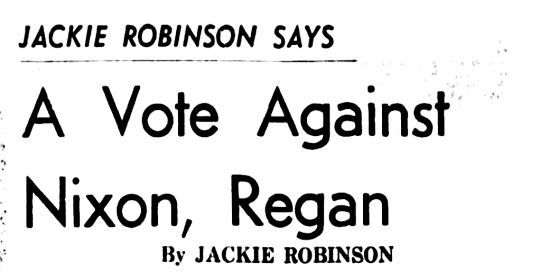

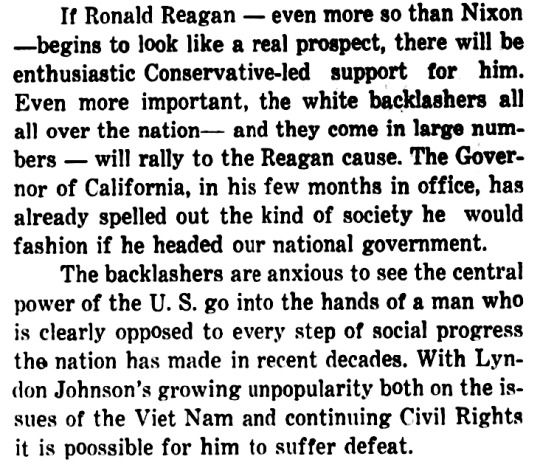


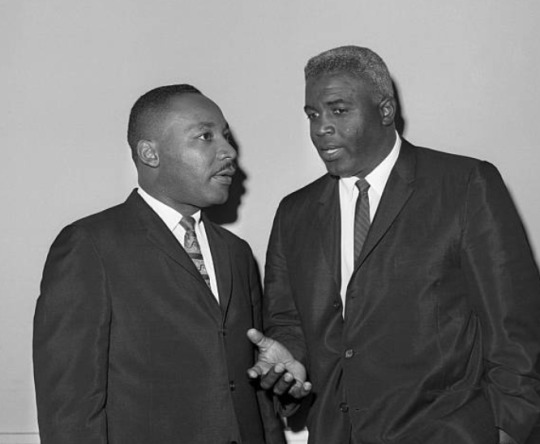
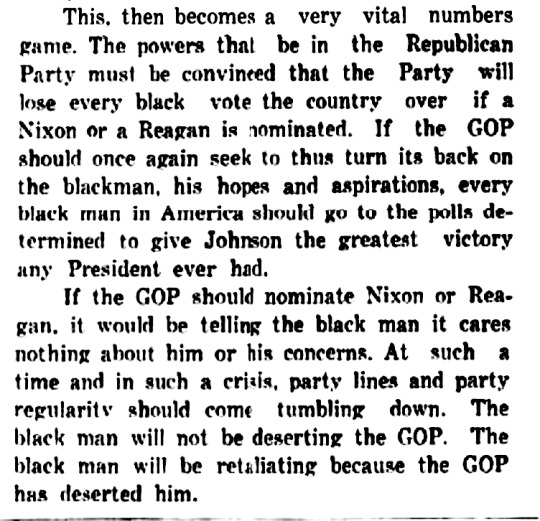
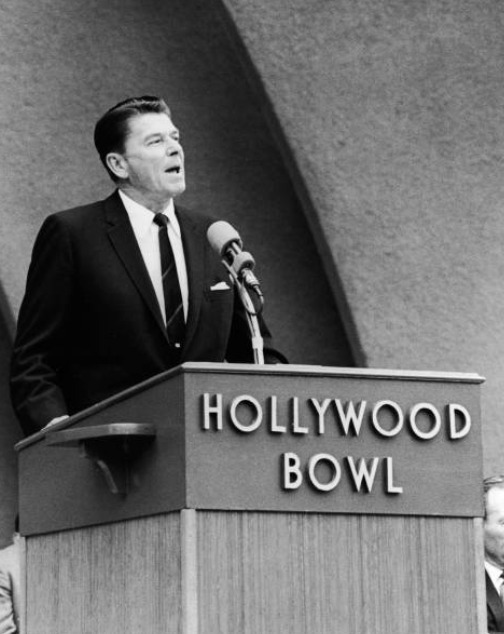
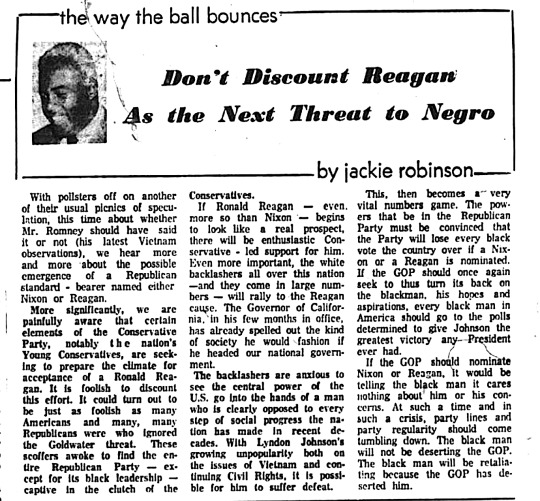
In an editorial published in the Pittsburgh Courier on September 30, 1967, baseball legend Jackie Robinson warned that Ronald Reagan would roll back all the gains made by the Civil Rights Movement, from the Voting Rights Act to Affirmative Action.
996 notes
·
View notes
Text
"When President Joe Biden signed a proclamation Tuesday establishing a national monument honoring Emmett Till and his mother, Mamie Till-Mobley, it marked the fulfillment of a promise Till’s relatives made after his death 68 years ago.
The Black teenager from Chicago, whose abduction, torture and killing in Mississippi in 1955 helped propel the Civil Rights Movement, is now an American story, not just a civil rights story, said Till’s cousin the Rev. Wheeler Parker Jr.
“It has been quite a journey for me from the darkness to the light,” Parker said during a proclamation signing ceremony at the White House attended by dozens, including other family members, members of Congress and civil rights leaders.
“Back then in the darkness, I could never imagine the moment like this, standing in the light of wisdom, grace and deliverance,” he said.
With the stroke of Biden’s pen, the Emmett Till and Mamie Till-Mobley National Monument, located across three sites in two states, became federally-protected places. Before signing the proclamation, the president said he marvels at the courage of the Till family to “find faith and purpose in pain.”
“Today, on what would have been Emmett’s 82nd birthday, we add another chapter in the story of remembrance and healing,” Biden said...
On Tuesday, reaction poured in from other elected officials and from the civil rights organizing community. The Rev. Al Sharpton said the Till national monument designation tells him “that out of pain comes power.”
House Democratic Leader Hakeem Jefferies said the monument “places the life and legacy of Emmett Till among our nation’s most treasured memorials.”
“Black history is American history,” he said in a written statement...
Till-Mobley demanded that Emmett’s mutilated remains be taken back to Chicago for a public, open casket funeral that was attended by tens of thousands of people. Graphic images taken of Emmett’s remains, sanctioned by his mother, were published by Jet magazine and fueled the Civil Rights Movement...
Altogether, the Till national monument will include 5.7 acres (2.3 hectares) of land and two historic buildings. The Mississippi sites are Graball Landing, the spot where Emmett’s body was pulled from the Tallahatchie River just outside of Glendora, Mississippi, and the Tallahatchie County Second District Courthouse in Sumner, Mississippi, where Emmett’s killers were tried...
The Illinois site is Roberts Temple Church of God in Christ in Chicago, where Emmett’s funeral was held in September 1955...
Mississippi state Sen. David Jordan, 90, was a freshman at Mississippi Valley State College in 1955 when he attended part of the trial of the two men charged with killing Emmett. As a state senator for the past 30 years, Jordan, who is Black, spearheaded fundraising for a statue of Emmett Till that was dedicated last year in Greenwood, Mississippi, a few miles from where the teenager was abducted.
On Tuesday, Jordan praised Biden for creating the Till national monument.
“It’s one of the greatest honors that a president could pay to a person, 14, who lost his life in Mississippi that’s created a movement that changed America,” Jordan told the AP."
-via AP, July 25, 2023
#black lives matter#civil rights#civil rights movement#emmett till#lynching#illinois#chicago#mississippi#united states#us politics#us history#american history#black history#african america history#joe biden#democrats#hakeem jeffries#national monument#national parks#national parks service#racism#cw murder#anti blackness#jim crow#cw lynching#cw torture#cw mutilation#hope
98 notes
·
View notes
Text

#palestine#israel#gaza#gaza strip#united nations#media#social justice#social media#history#jerusalem#joe biden#yemen#civil rights#human rights#middle east#america
55 notes
·
View notes
